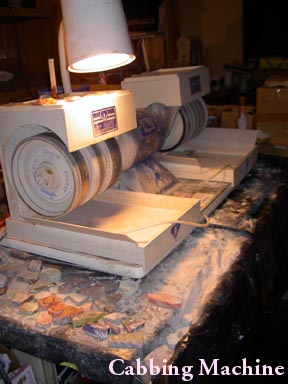Articles by EJA Members
Lapidary - One Little Cabochon
by Ahna of Art Created
One of the first things you learn in a metalsmithing class is how to bezel-set a cabochon. Because of that assignment, I went searching for some interesting stones to set. That's when I fell in love with rocks! I have over 10 years experience in stained glass work, and the concepts of cutting, shaping and polishing cabochons is very similar to working with stained glass!
I didn't have anyone to tell me what I needed, so I started doing a lot of research into lapidary equipment. I figured out that, at the very least, I would need a Trim Saw and a Cab Machine. A Trim Saw is used to cut down rock slabs (flat pieces already cut from rough rock) as close as possible to the shape of the cabochon. This is a basic machine that uses a blade, and has a water reservoir, used to cut stone. Nothing fancy is needed, you just want to be sure that the surface area on the machine is about 4-5 inches on each side of the blade.
A Cab Machine is used to shape and polish the cabochon. Here, I made a mistake. I found three different machines with very different prices, from $336 to $1600. I decided to go in the middle, and selected a machine that cost $795. The description said it was all I would need, what it didn't say was that you had to change out pads and wheels every few minutes, and had to take off all the wheels to change the saw blade! That was fine for the first day or so, but I quickly realized this was going to be a nightmare! I returned it; top-of-the-line, here I come! I got a Diamond Pacific Ginie with 6 wheels and a totally separate machine for cutting the slabs, and it was well worth the extra money! When it comes to cabbing equipment, I don't recommend cutting corners, you will end up wasting a lot of your time!
So, here's a cost breakdown, with tax and shipping:
Trim Saw $425 (only for cutting slabs, not rough rocks)
Cab Machine $1,600

Additional supplies needed: Templates, apron, safety glasses, dopping supplies, coolant, polish, blades, rock slabs
Now, if you really want to start from the ground up, you need a Slab Saw for cutting rough rock;
Cost: $1,700
Additional supplies: 5 gallons of water-soluble cutting oil, sharpening stone.
Maintenance Costs: If you do your cabbing at a 'hobby' level, you will probably need to buy new wheels and blade for the Slab Saw about once every 12-18 months. The Trim Saw will require more blades, a good blade for a 6" Trim Saw is $28, and you should have two different sized blades, depending on what you're cutting. Material like Rhodochrosite is soft and easy to cut, but materials like agate are very hard, and will dull a blade quickly. A sharpening stone will help extend the life of the blades.
A word about cabochons... there are two different types. I refer to the first as a 'generic' cab, in which you cut as many cabochons from a slab as you can. You'll get more cabs, and very little waste, which is more cost-effective. Then, there is a "Designer Cabochon", where you select the best pattern or colors on the slab to create a more beautiful cabochon. You create a spectacular piece, but there will be more waste, and a higher cost as a result.
Last but not least is your time. If you are starting with a rough rock, a slab saw will take about 20 minutes to make a pass; the nice thing about this is that they come with an auto-feed system, so while you're cutting a rock in that machine, you can be working on something else. I can usually spent about an hour at the Trim Saw to produce 10-15 cabs, depending on what material I'm trimming. Harder rocks take longer to cut through. The cabbing machine takes the longest, and you don't want to rush in any of these processes. This will need anywhere from 20-50 minutes per cabochon.
In summary, each individual cabochon will take 45 minutes to 1-1/2 hours to make. Your basic cost for equipment will be about $3,725, plus the additional supplies and the raw material/rough stone. You will need to produce 150 cabs and sell them for an average of $25 each to pay for the equipment. By that time you'll need to replace some blades, and you can start recovering your costs for supplies and stone. Sorry. . . it will be awhile before you can start getting paid for your time!
(C) 2007 Self Representing Artists